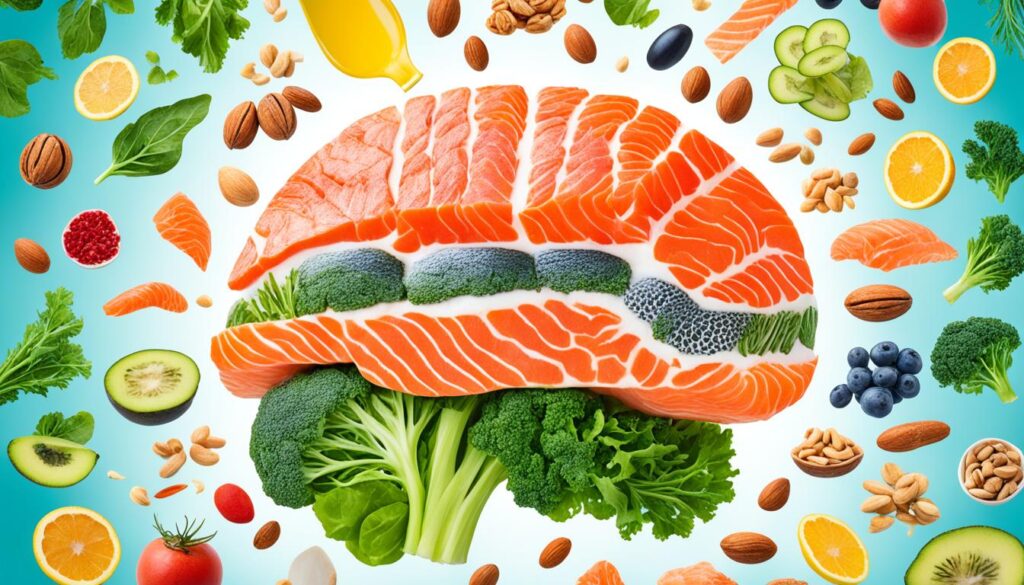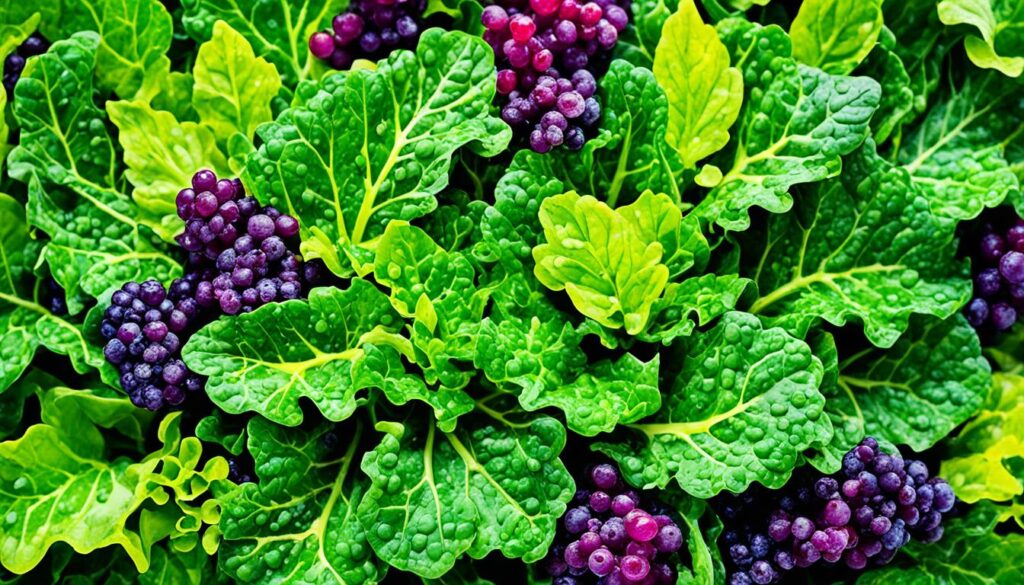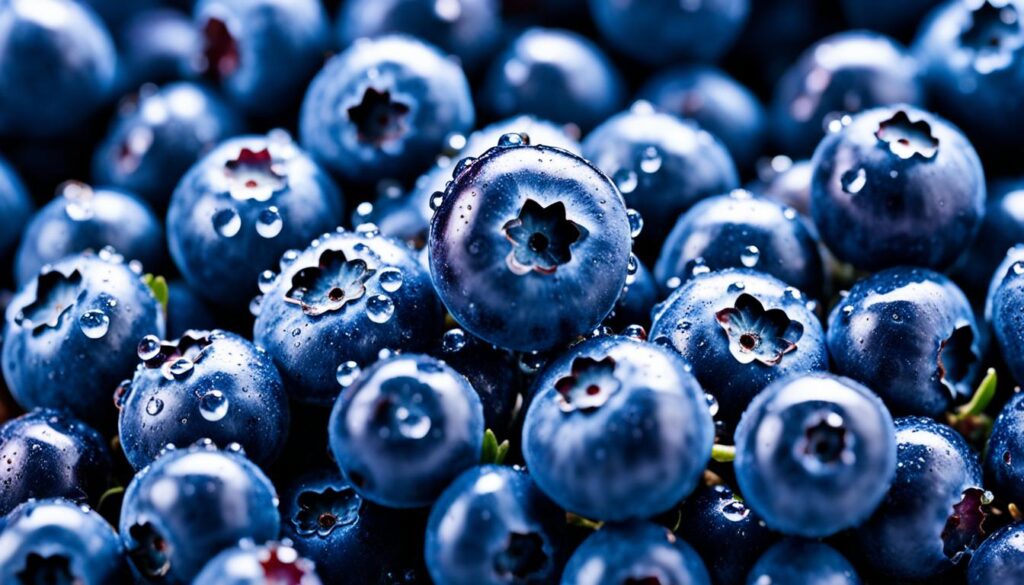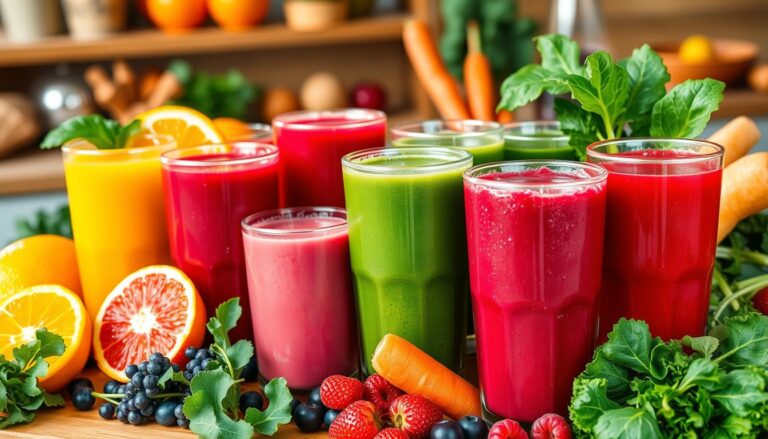Can what you eat really help your brain work better? Yes, it can! Protein is key for keeping your brain healthy and sharp.
About 1 in 9 adults over 45 feel their memory is slipping or they’re getting confused. But eating the right proteins can help keep your brain in top shape and might even stop cognitive decline.
Key Takeaways
- Protein is essential for producing neurotransmitters, which facilitate communication between brain cells.
- Omega-3 fatty acids found in fatty fish like salmon can improve memory and cognitive function.
- Consuming at least two servings of fatty fish per week may lower the risk of dementia and Alzheimer’s disease.
- Antioxidants in foods like berries, leafy greens and dark chocolate can protect the brain from oxidative stress.
- Nutrient dense proteins from a variety of sources can support overall brain health and cognitive abilities.
The Importance of Protein for Brain Function
Protein is a big part of the brain after water. This shows how important protein is for keeping the brain healthy and working right. Amino acids which make up proteins help make neurotransmitters. These are key for talking between brain cells. Eating lean protein good fats, and complex carbs is key for a healthy brain.
Amino Acids and Neurotransmitters
The brain needs amino acids like tryptophan, tyrosine, histidine, and arginine to make neurotransmitters and other brain helpers. These amino acids get into the brain and can change how we think and feel. For example, tyrosine can help with thinking and handling stress.
Protein’s Role in Cognitive Performance
How much protein you eat can change brain amino acid levels and serotonin which affects mood and thinking.
Not getting enough good protein can mess with making neurotransmitters which can change how we feel. Eating protein at every meal helps the brain work well as it uses glucose and amino acids for energy. Good protein sources include beef poultry fish dairy, eggs, tofu, nuts, seeds, and peanut butter.

Amino acids are the building blocks of proteins, and they play a crucial role in the production of neurotransmitters which are essential for brain function and cognitive performance.
| Amino Acid | Function in Brain |
|---|---|
| Tryptophan | Precursor for serotonin, a neurotransmitter that regulates mood, sleep, and appetite |
| Tyrosine | Precursor for dopamine and norepinephrine neurotransmitters that impact mood attention, and motivation |
| Histidine | Involved in the production of histamine, a neurotransmitter that plays a role in wakefulness and cognition |
| Arginine | Involved in the production of nitric oxide which helps regulate blood flow and oxygen delivery to the brain |
In summary protein and its amino acids are key for the brain to work right. They help make neurotransmitters keep thinking sharp, and support brain health.
Salmon: The Superfood for Brain Health
Salmon is a top choice for boosting brain health and cognitive function. It’s full of nutrients that help the brain in many ways.
Omega-3 Fatty Acids: EPA and DHA
Salmon is famous for its omega-3 fatty acids, especially EPA and DHA. These are key for brain health and help keep the brain working well. Eating salmon can make memories sharper in people with Alzheimer’s disease.
Benefits of Salmon for Cognitive Well Being
Salmon’s protein is great for making neurotransmitters, which are vital for the brain. It also has vitamins and minerals like vitamin B12, selenium, and niacin that support brain health. Eating fatty fish like salmon twice a week can lower the risk of dementia and Alzheimer’s by 10% and 30%, respectively.
Salmon’s astaxanthin is an antioxidant that boosts brain function and overall thinking. Selenium in salmon protects the brain from damage and may help prevent some cancers.
| Nutrient | Wild Salmon | Farmed Salmon |
|---|---|---|
| Calories per 3.5 oz | 182 | 206 |
| Protein per 3.5 oz | 25 g | 22 g |
| Vitamin B12 % DV | 127% | 117% |
| Selenium % DV | 85% | 75% |
| Niacin % DV | 63% | 50% |
| Vitamin B6 % DV | 56% | – |
| Phosphorus % DV | 21% | 20% |
Salmon is packed with nutrients that support brain health. Adding it to your meals can help keep your brain sharp and healthy.

Eggs A Delicious Source of Brain Boosting Nutrients
Eggs are more than just a tasty breakfast choice. They are packed with nutrients that help your brain. The egg yolk is full of choline. This nutrient is key for fighting inflammation and keeping your brain healthy. It helps with memory and lets brain cells talk to each other.
Eggs also have tryptophan, an amino acid that builds serotonin, the happiness molecule. This means eggs can help keep your mood up and improve your thinking skills.
Adding eggs to your meals is a tasty way to boost your brain health. You can enjoy them scrambled, poached, or fried. Try a veggie omelet or a breakfast taco packed with protein for a great start to the day. Your brain will appreciate it.
Eggs are the perfect brain food, providing a rich source of choline and tryptophan to support memory, mood, and cognitive function.
Next time you want to feed your brain, grab an egg. It’s full of nutrients that are good for your mind. Your brain will thank you.
Nuts and Seeds Packed with Brain Friendly Fats
Nuts and seeds are great for brain health. They are full of protein, healthy fats, and important vitamins and minerals. These foods help with thinking and remembering things. Walnuts and pumpkin seeds are just a couple of examples of how they can boost your brain.
Walnuts A Powerhouse for Cognitive Function
Walnuts are amazing for your brain. They have lots of antioxidants even more than other nuts. They also have a lot of omega-3 fatty acid ALA which fights inflammation and lowers heart disease risk. Eating walnuts hazelnuts and almonds can make your brain work better and help you remember things.
Walnuts do more than just boost your brain. They have tryptophan, an amino acid that makes you feel calm and happy by increasing serotonin. With antioxidants, healthy fats, and mood boosters walnuts are a top choice for brain health.
| Nut/Seed | Protein per serving | Omega-3s | Other Brain Benefits |
|---|---|---|---|
| Walnuts | 4g 1 oz | ALA omega-3s | Antioxidants, tryptophan for mood |
| Pumpkin Seeds | 10g 1/4 cup | – | Zinc, magnesium fiber |
| Chia Seeds | 5g 2 tbsp | Highest plant-based source | – |
| Flaxseeds | 5g 2 tbsp | ALA omega-3s | – |
Other nuts and seeds like pumpkin chia, and flaxseeds are also good for your brain. Hemp seeds give you 10 grams of protein in just a quarter cup. Pumpkin seeds have 10 grams of protein and 2 grams of fiber, plus lots of zinc and magnesium.
Chia seeds are full of omega-3s. Flaxseeds and others give you 5 grams of protein in 2 tablespoons. Eating different nuts and seeds every week helps your brain work well and stay healthy.

Adding nuts like walnuts, almonds, and cashews to your diet can have a calming, mood-boosting effect due to the release of serotonin.
Adding a mix of nuts and seeds to your meals gives your brain what it needs to stay sharp. From walnuts to pumpkin seeds these foods are tasty and easy ways to support your brain health.
Best types of protein to improve brain health
Lean meats like sirloin steak are great for boosting brain health. They are full of iron, a key mineral for making neurotransmitters and carrying oxygen to the brain.
This means better oxygen flow which helps with focus and learning new things. Eating lean meats can also protect against Alzheimer’s disease and other brain issues as we age.
The brain needs a lot of energy to work well. Lean meats give it the protein it needs to stay active and focused. Plus the iron in them helps blood flow better to the brain, making it work better.
Adding lean meats like sirloin steak to your meals is a smart way to improve brain health. These foods give the brain the iron and nutrients it needs. This supports focus, concentration, and overall brain function.

Lean meats are a powerful source of brain-boosting iron, helping enhance attention and concentration for improved cognitive function.
Leafy Greens Antioxidants for Neuroprotection
Leafy greens like spinach, kale, and arugula are great for your brain health. They are full of vitamins, minerals, and antioxidants. These help protect your brain from getting worse as you age.
Vitamin E in leafy greens protects cells from free radicals. Studies say it can help stop or slow down brain decline in older people. Vitamin K in these greens also makes memory sharper and boosts thinking skills. Plus beta carotene can slow down brain decline.
Leafy greens are full of antioxidants that are good for your brain. These compounds fight off free radicals that harm brain cells. Eating more leafy greens can keep your brain healthy and support its function.

Adding different leafy greens to your meals is a great way to keep your brain healthy. From spinach and kale to arugula and Swiss chard, these veggies are full of benefits for your brain.
Leafy greens are the foundation of a brain healthy diet. The antioxidants and vitamins they contain are essential for maintaining cognitive function and preventing neurodegeneration.
- Spinach is rich in vitamin E, which protects cells from oxidative stress.
- Kale is a powerhouse of vitamin K, which is linked to improved memory and cognition.
- Arugula contains beta carotene, an antioxidant that may slow down cognitive decline.
Eating more leafy greens can help keep your brain healthy for the long term. Enjoy them in salads, smoothies, or sautéed dishes. These veggies are an easy way to boost your brain power and keep your mind sharp.
Berries Nature’s Brain Boosters
Blueberries are a top choice for brain health. They are packed with antioxidants, like flavonoids. These help increase blood and oxygen flow to the brain, making you more focused. Studies show they can even help those with mild cognitive issues.
Berries offer more than just brain benefits. They protect against heart disease cancer, and Alzheimer’s. A study with 40 people found that a berry smoothie made them faster and more accurate in tasks. Another study with 12 groups showed that berries or berry supplements improved memory tests.

Blueberries are a top superfood for brain health. They contain anthocyanins, which boost brain cell communication. These compounds also help the brain stay flexible, aiding in learning and remembering new things.
Blueberries are bursting with antioxidants, specifically flavonoids, that stimulate the flow of blood and oxygen in the brain, resulting in boosted concentration.
Legumes Fiber and B Vitamins for Brain Health
Legumes are often overlooked but are a powerhouse for brain health. They are full of fiber, B vitamins, and other nutrients that help the brain work better and stay healthy.
Beans, lentils, and chickpeas are not big in the American diet but they should be. Eating more of these foods can really help us. For example, eating lentils can help prevent type 2 diabetes in older adults. They can also help with weight loss even if you’re not cutting calories.
Legumes are packed with nutrients. A cup of cooked chickpeas has 269 calories and 14.5 grams of protein. Lentils have 230 calories and 17.9 grams of protein, plus lots of other vitamins and minerals. You can add them to many dishes making them easy to include in your meals.
The fiber and B vitamins in legumes are great for the brain. Fiber keeps you full and helps your body release sugar slowly which is good for your focus and memory. B vitamins help make important brain chemicals, which are key for making new memories. Omega-3 fatty acids in some legumes also support brain health.
Adding more legumes to your diet is an easy way to boost your brain health. Whether you like classic beans or want to try new ones like mung beans, they’re full of fiber and B vitamins.
| Legume | Calories | Protein | Fat | Carbs | Fiber | Key Nutrients |
|---|---|---|---|---|---|---|
| Chickpeas | 269 | 14.5g | 4.25g | 45g | 12.5g | Folate, Copper, Manganese |
| Lentils | 230 | 17.9g | 0.752g | 39.8g | 15.6g | Thiamine, Folate, Copper, Iron, Zinc |
| Green Peas | 134 | 8.58g | 0.35g | 25g | 8.8g | Thiamine, Folate, Manganese, Vitamin K |
| Kidney Beans | 225 | 15.3g | 0.885g | 40.4g | 13.1g | Thiamine, Folate, Copper, Manganese, Iron |
| Black Beans | 227 | 15.2g | 0.929g | 40.8g | 15g | Thiamine, Folate, Iron, Magnesium, Manganese |
| Soybeans | 296 | 31.3g | 15.4g | 14.4g | 10.3g | Riboflavin, Folate, Vitamin K, Iron, Manganese, Phosphorus |
Legumes are a great food for brain health. Adding them to your diet can help with thinking, memory, and overall brain health.
Whole Grains Complex Carbs for Steady Energy
Whole grains are great for brain health. They are full of complex carbs, omega-3s and B vitamins. These nutrients support brain function. The complex carbs give you steady energy. This helps with mood behavior, learning, and memory.
Brown rice is a top whole grain. It’s full of B-vitamins, which turn homocysteine into brain chemicals for learning and memory. Switching to brown rice could lower type 2 diabetes risk by 36%.
- The 2015-2020 Dietary Guidelines suggest eating 6 ounces of grains daily with half from whole grains.
- Women eating 2 to 3 whole-grain servings daily were 30% less likely to have heart attacks or die from heart disease.
- Choosing whole grains lowers cholesterol, LDL cholesterol, triglycerides, and insulin levels.
Adding more whole grains to your diet helps brain health and keeps energy up. Not all whole grain products are the same choose ones with a carbohydrate to-fiber ratio of less than 10:1 for the best nutrition.
Eating whole grains offers modest protection against colorectal cancer, with data suggesting a cumulative risk reduction of 21%.
Beverages that Support Cognitive Function
Drinks we drink can greatly help keep our minds sharp and our brains healthy. Drinks like coffee and red wine offer benefits that can boost our thinking skills. They support our brain’s health and function.
Coffee: A Cognitive Enhancer in Moderation
Coffee is known for its caffeine, which can make us more alert and focused. In small amounts, it helps with focus, quick thinking, and remembering things. But, too much coffee can be bad, so it’s important to drink it in moderation.
Red Wine Resveratrol for Improved Blood Flow
Red wine is also good for the brain because it has an antioxidant called resveratrol. This antioxidant helps blood flow better to the brain. Drinking a small amount of red wine each day might even lower the risk of Alzheimer’s and help with paying attention.
Adding these drinks to a healthy diet and lifestyle can help keep our brains working well. Just remember, it’s all about balance. These drinks can really help our brains stay sharp over time.
Conclusion
Unlocking the secrets to brain health is easy with a diet full of nutrient-rich protein sources. Foods like omega-3 rich salmon and memory-boosting walnuts are great for your brain. They have essential amino acids, antioxidants, and vitamins your brain needs.
Choosing protein-rich foods like eggs legumes and lean meats helps your brain. It supports neurotransmitter production, strengthens neural connections, and lowers the risk of cognitive decline. Don’t forget the benefits of berries citrus fruits, and dark chocolate for your brain.
If you want to keep your mind sharp and focused as you age, eat a diet full of these protein-rich foods. Your brain will be grateful!





